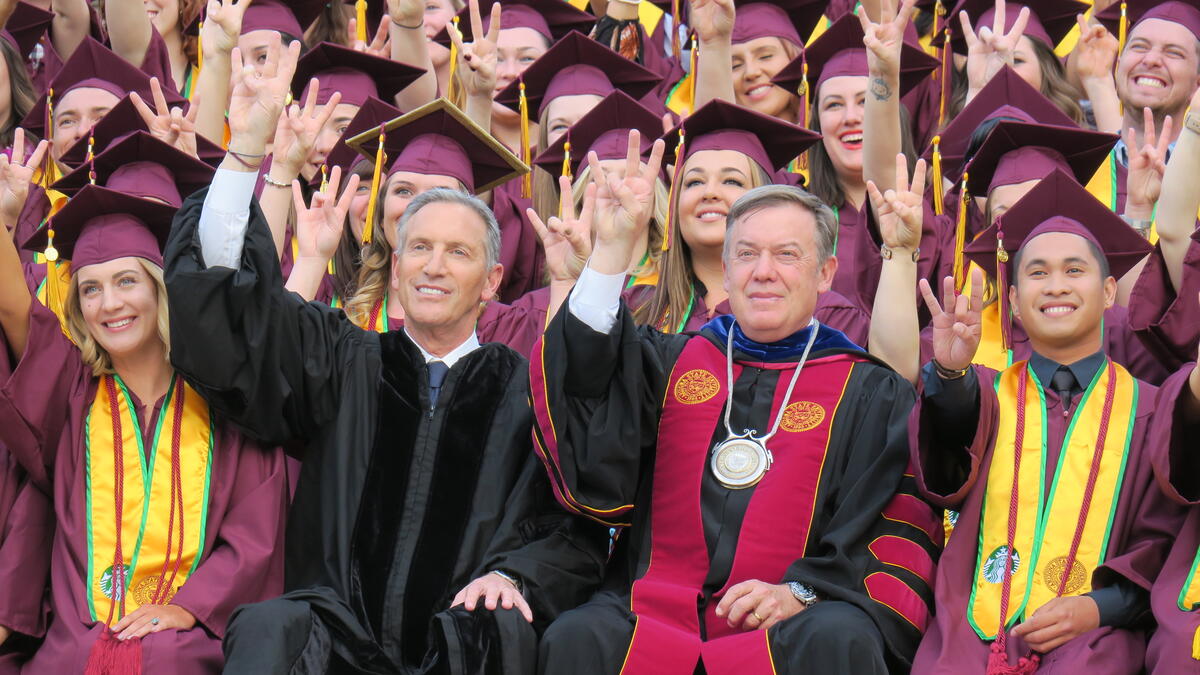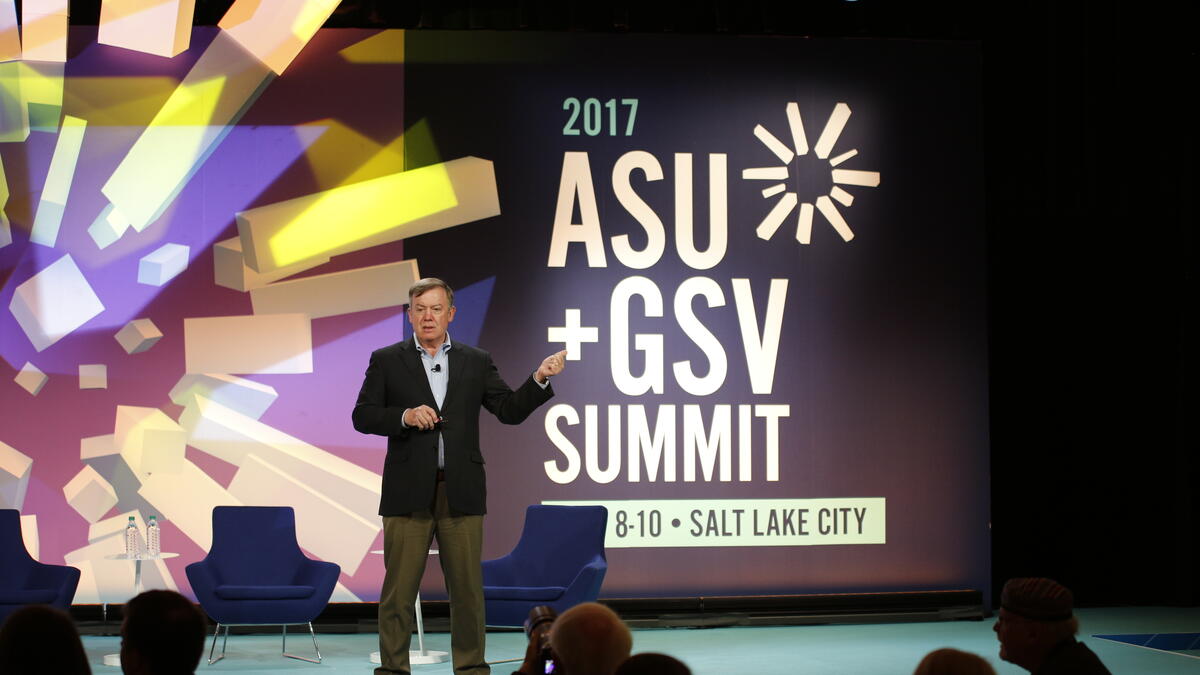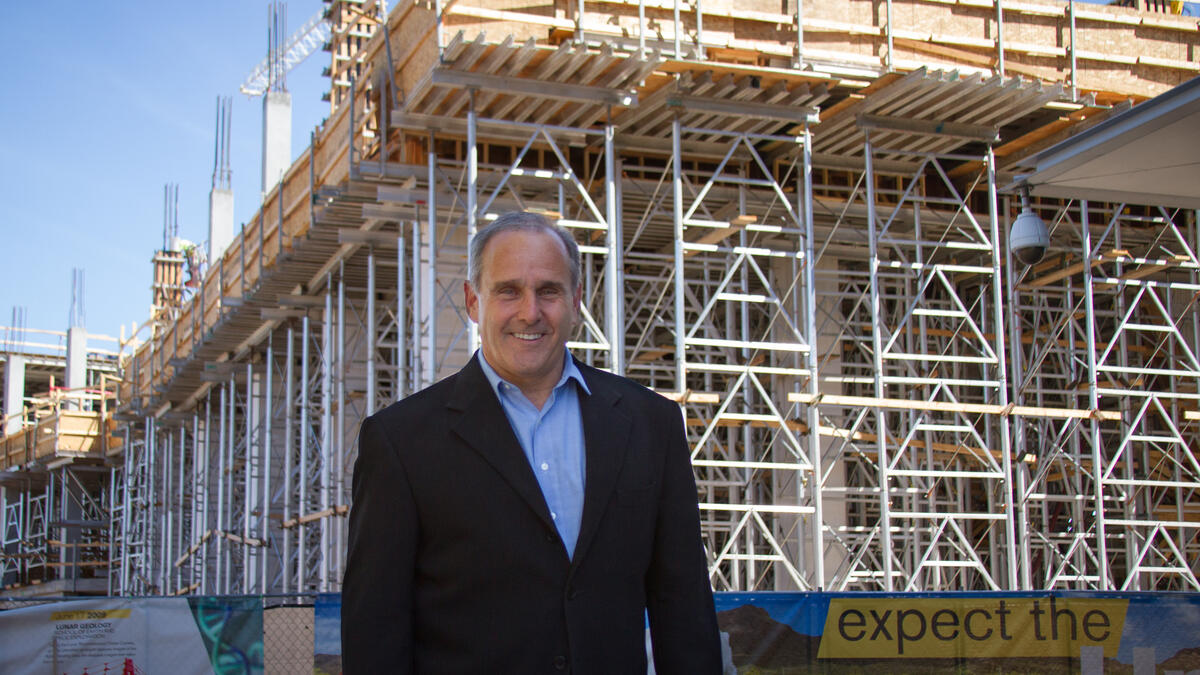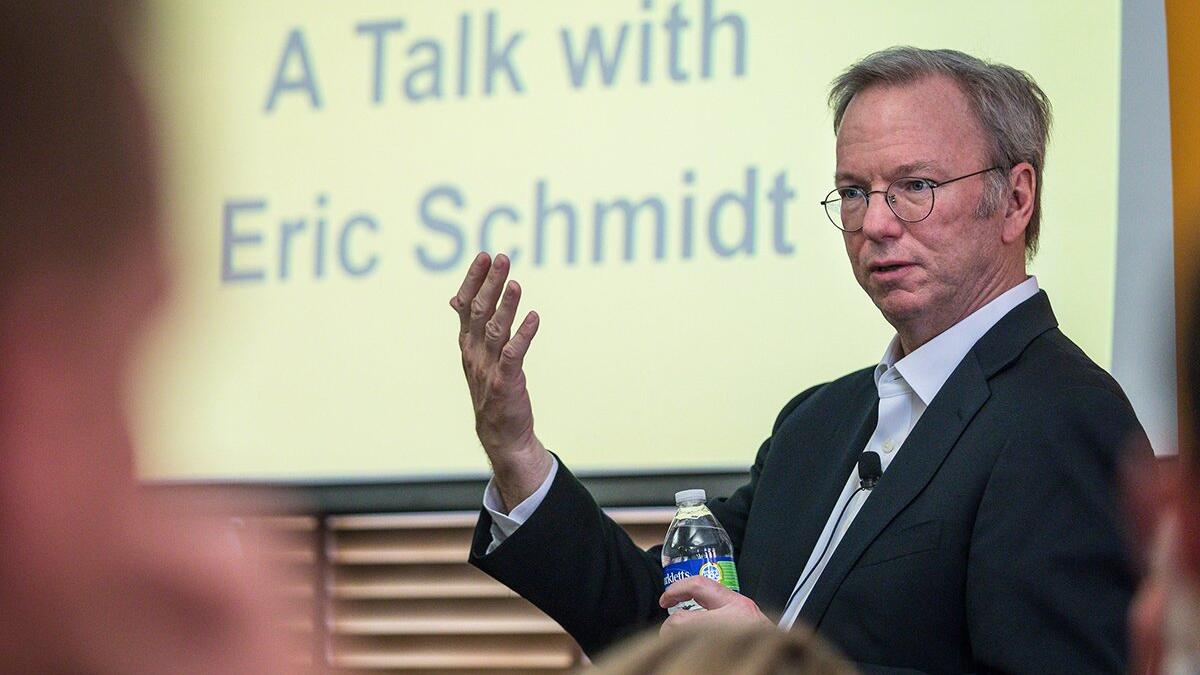
Updates from the President
Updates from President Crow: May 24, 2017
- "I am because you are" - A commencement season to remember
- ASU + GSV Summit examines the innovations 21st century education needs
- FY18 budget marks a new wave of support for Arizona's universities
- ASU welcomes Eric Schmidt, head of Google parent company Alphabet, Inc.

Giving the "forks up" with Starbucks Executive Chairman Howard Schultz and our Starbucks College Achievement Plan partner graduates.
"I am because you are" - A commencement season to remember
Our 2017 spring commencement ceremonies will be remembered as one of the most memorable graduation seasons at ASU. Blessed with unseasonably cool weather, our veteran stole ceremony kicked off a week-long series of special events designed to recognize our nearly 14,000 new ASU graduates. Festivities included multiple special interest convocations, a luncheon for commencement speaker and honorary degree recipient Howard Schultz, executive chairman of Starbucks, and a forum where our more than 300 Starbucks College Achievement Plan (SCAP) graduates and their families were invited to share their touching stories about their pathway to a college degree. More than 7,000 partners are currently enrolled in the program.
In his Undergraduate Commencement address, Howard Schultz encouraged our newest grads to summon their compassion and marshal their talent and energy to give back to others. He also taught them a new word of African origin, "Unbuntu", which means "I am because you are." It was a powerful message that underscored the abundant gratitude at our ceremonies, and my appreciation for everyone who helps ASU to fulfill its teaching, learning and discovery goals.

Presenting keynote remarks on continued need for higher education evolution at the ASU + GSV Summit on May 10, 2017.
ASU + GSV Summit examines the innovations 21st century education needs
Right after commencement, I traveled to the 2017 ASU + GSV Summitin Salt Lake City, Utah. This annual event convenes education technology stakeholders from across the country and is the largest conference of its kind. Leading edge educators, inventors, policymakers and investors come together to share ideas, explore partnerships, and recognize leaders who are spearheading the future of education. This year's speaker roster included James Shelton, Jeff Weiner, and Andre Agassi.
My own keynote remarks focused on the real innovations needed in technology-enhanced teaching and learning in order to continue the evolution of higher education. We need to understand how students learn now and how we can adapt our teaching and learning strategies to better meet their needs and the challenges facing society. We also need to identify and support educators who are already developing and implementing innovative approaches to enhancing education excellence, access and impact, which is why ASU was proud to partner again with McGraw-Hill to present the Harold W. McGraw, Jr. Prize in Education during the Summit.
ASU is dedicated to continue being a leader in meaningful, technology-enhanced education at all levels, and we are proud to see the Summit thrive as a pioneering forum for the advancement of new ideas and alliances.

Biodesign Institute Executive Director, Dr. Joshua LaBaer, stands in front of Biodesign C, future Home of five new research centers including the ASU-Banner Neurodegenerative Disease Research Center that will study Alzheimer's, Parkinson's and other dementias.
FY18 budget marks a new wave of support for Arizona universities
As the spring semester and the legislative session drew to a close, the fiscal year 2018 state budget was approved, which included a long-term commitment to Arizona's public universities in the form of a $1B investment in research infrastructure. This action, as advanced as part of Governor Doug Ducey's executive budget proposal, will enable ASU to advance state-of-the-art research facilities in support of the groundbreaking problem-solving being conducted by our faculty and students. It will also help us to attract the best and brightest researchers and students who are looking to evolve their ideas at a top institution for innovation.
Through earlier investments that allowed the creation of the Biodesign Institute at ASU and ISTB IV, we are now able to welcome leading edge scientists like Dr. Joshua LaBaer, a top researcher conducting revolutionary cancer and personalized medicine, and Dr. Lindy Elkins-Tanton, a top planetary scientist leading the upcoming NASA mission to the metal asteroid Psyche. These are only two of the many ways that the research happening at ASU leads to game-changing knowledge and solutions that stand to impact our collective future, but the recent announcement that ASU earned a record 14 NSF early career faculty awards indicates our trajectory.
With this new support, ASU is positioned to join a select group of world-class research universities without medical schools, like MIT and Georgia Tech, and to build meaningfully on its legacy of innovation and service. We are excited to see what this growth will yield.

Eric Schmidt, executive chairman of Alphabet, Inc. presents as part of the Frank Rhodes Lecture Series on the Creation of the Future on May 12, 2017.
ASU welcomes Eric Schmidt, head of Google parent company Alphabet, Inc.
Among a growing number of thought leaders taking note of ASU's commitment to innovation, access and excellence, it was my pleasure to welcome Eric Schmidt, current leader of Alphabet, Inc. and former Google CEO, to our Tempe campus last week. Presenting as part of the Frank Rhodes Lecture Series on the Creation of the Future , Schmidt discussed the disruptive nature of science and technology, and how the current era of rapid change empowers the development of better and more far-reaching solutions. He also stressed that successful leaders work harder than anyone else, which is why they can change the world. As we continue to navigate the current atmosphere of significant negativity, it was important to hear a message of optimism and opportunity. ASU is one of only four other schools Schmidt has addressed this year - the others being Harvard, Princeton, and MIT - which speaks to the talent and potential here. We must keep driving forward to fulfill all that is possible.